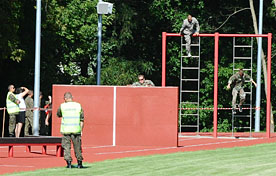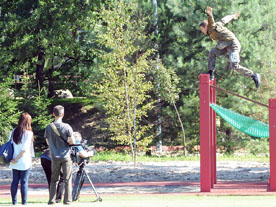Competing to be the best
“Running through thickets in military boots is in an endurance class of its own,” grimaces Falk Grundschok, after seeing his exhausted teams arriving back from the reserves pentathlon orienteering course in Warsaw, Poland, on 7 August. Some eleven NATO nations took part in the NATO-supported CIOR (Interallied Confederate of Reserve Officers) annual pentathlon event. Participants train for months beforehand to be prepared. Unlike a normal pentathlon, this special version consists of specialist military skills such as shooting, land and water obstacle events and land navigation, as well as first aid and the law of armed conflicts as extras. If that’s not enough, for those taking part in this seriously competitive weekend, there can also be light-hearted initiation ceremonies to contend with.

“It was really worth it,” says a sleep-deprived Grundschok, returning from aiding his German team to a third place ranking overall in his eighth pentathlon, with a second in the veterans category. “Competition was demanding, especially because the German team found it quite difficult to get used to the Polish rifles – AK-74 derivatives,” he says.
Each year military reservists spend months training before descending upon a patch of countryside somewhere in a NATO country – next is Denmark in July 2012 – to compete in three gruelling days of specialized events.
As reservists, this can often mean training on top of their civilian job commitments. Being self-employed is a big advantage, explains Grundschok, especially when it comes to organizing training and military service. For others such as Canada’s head coach, Simon Gasse, training could be enfolded into his job as a full-time physical fitness instructor to the Canadian forces. Even then he admits that on top of a forty-hour week at work, it is difficult and one has to be strict with time management.
Training as a way of life

To do well in the CIOR pentathlon requires expert skills and endurance, says Grant Staats, the officer in charge of the United States CIOR Military Competition programmes. “Competitors must spend extra time away from their families and jobs to train in all of the competition’s components,” he says. “I, as well as other competitors, have prepared for this annual experience while in Iraq, Kuwait and Qatar. This year’s team has members who have just returned from Afghanistan.”
Although Staats didn’t compete this year himself, he was instrumental in training the United States team which started preparing the previous winter. “Developing a strong base in running and swimming are focal areas during winter, and then track and speed work during spring,” he says describing the rigorous training schedule. “Candidates then concentrate on distance running in the forest and speed work in the pool during May and June. Training camp takes place at Camp Johnson and Camp Ethan Allen in July.” For all those taking part it is a serious commitment.
Part of the reservist family

Staats agrees, adding that he left active service to start a family and be near his loved ones at a home while also maintaining his links with the military. In 25 years as a reservist, he has been deployed three times to the Middle East. “The reserve arrangement allowed me to include all of the important elements of my life,” he says adding that the reserve community is served by dedicated men and women who feel compelled to serve their country and protect their families and freedoms. “I have found a strong brotherhood of comrades from within my community, from other branches of the service, and from the deep and lasting friendships that I have made with CIOR partner nations.”
And it’s with relish that he ends the interview by recounting a brotherhood initiation story from the CIOR pentathlon in Istanbul, Turkey in 2008. Called the ‘pill box’, an infamous part of the land obstacle course, he says it consisted of a two-by-two foot hole with a square opening that one dived into at speed.
“When executed flawlessly, a competitor simply ducks their head and launches into the hole and slides through its five foot tunnel. Not so much for me, it seems my duck was more of a goose and my long-necked-head was laid open by the unforgiving obstacle, so called because of what one needs to take afterwards,” he explains. Although he recovered, Staats distinctly remembers how he was paraded “under loving applause” across the initiation field to the medics. “It was embarrassing to say the least,” he says, “but, I was moved by the care and emotion of this strong brotherhood.”
